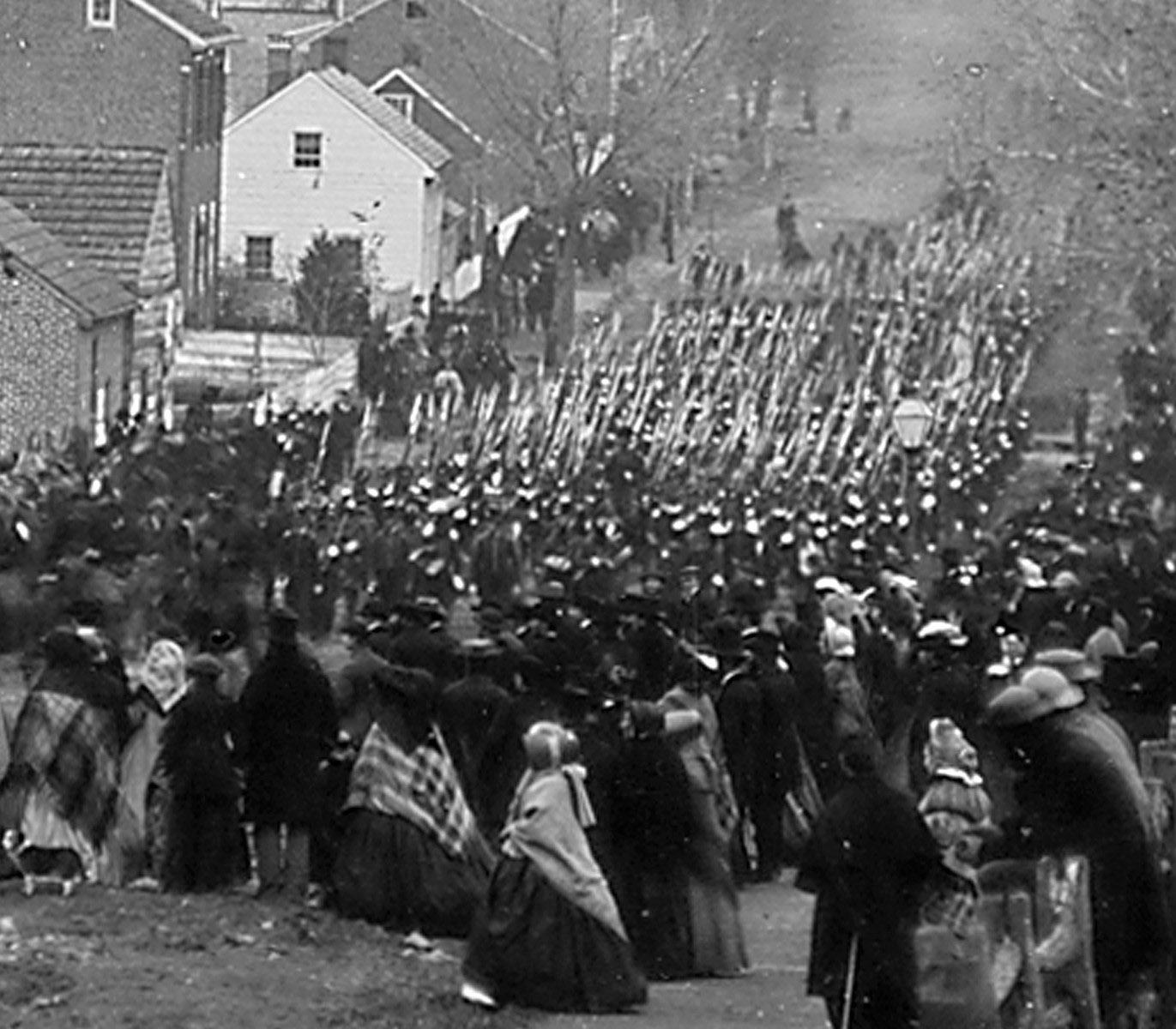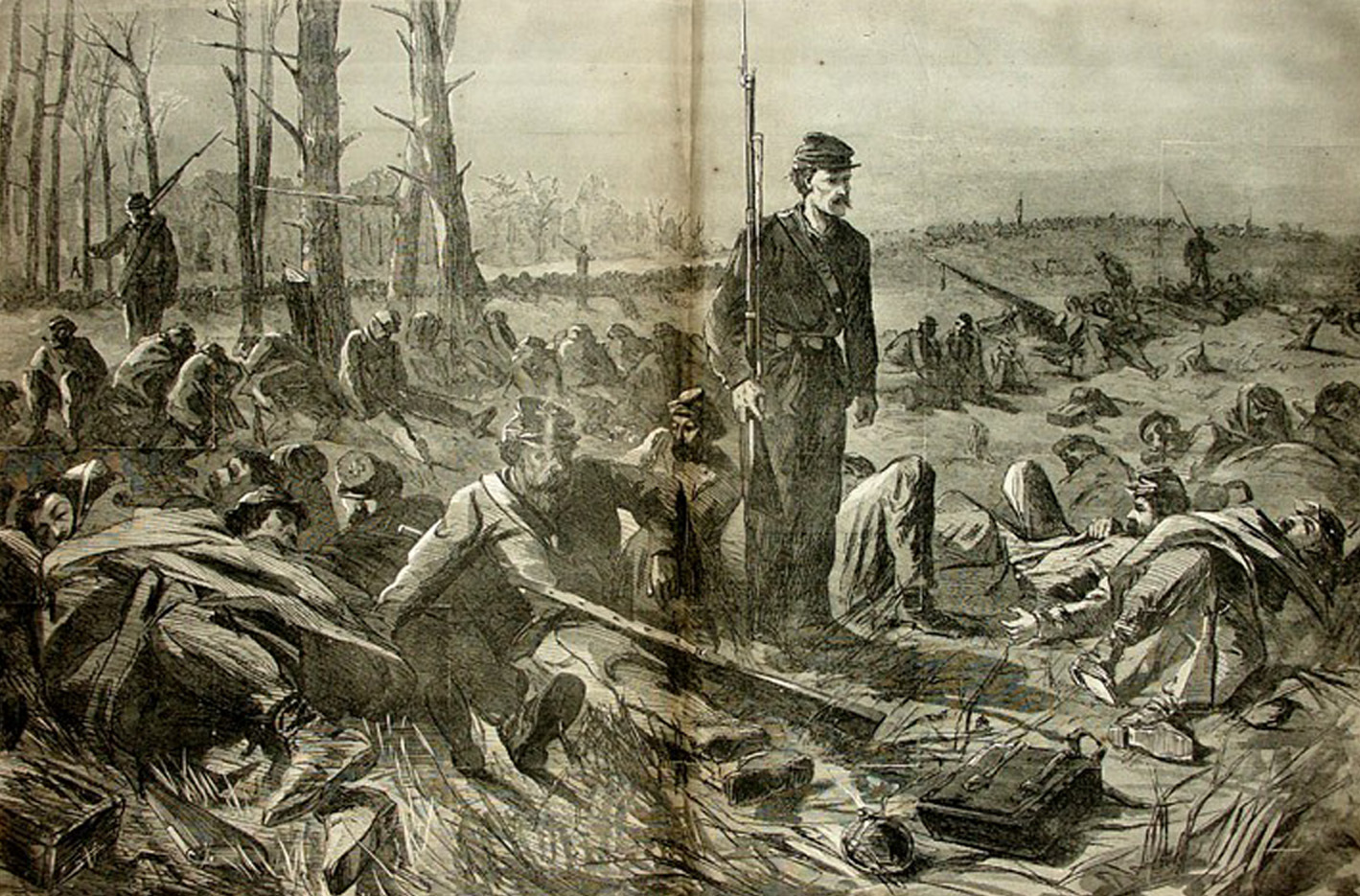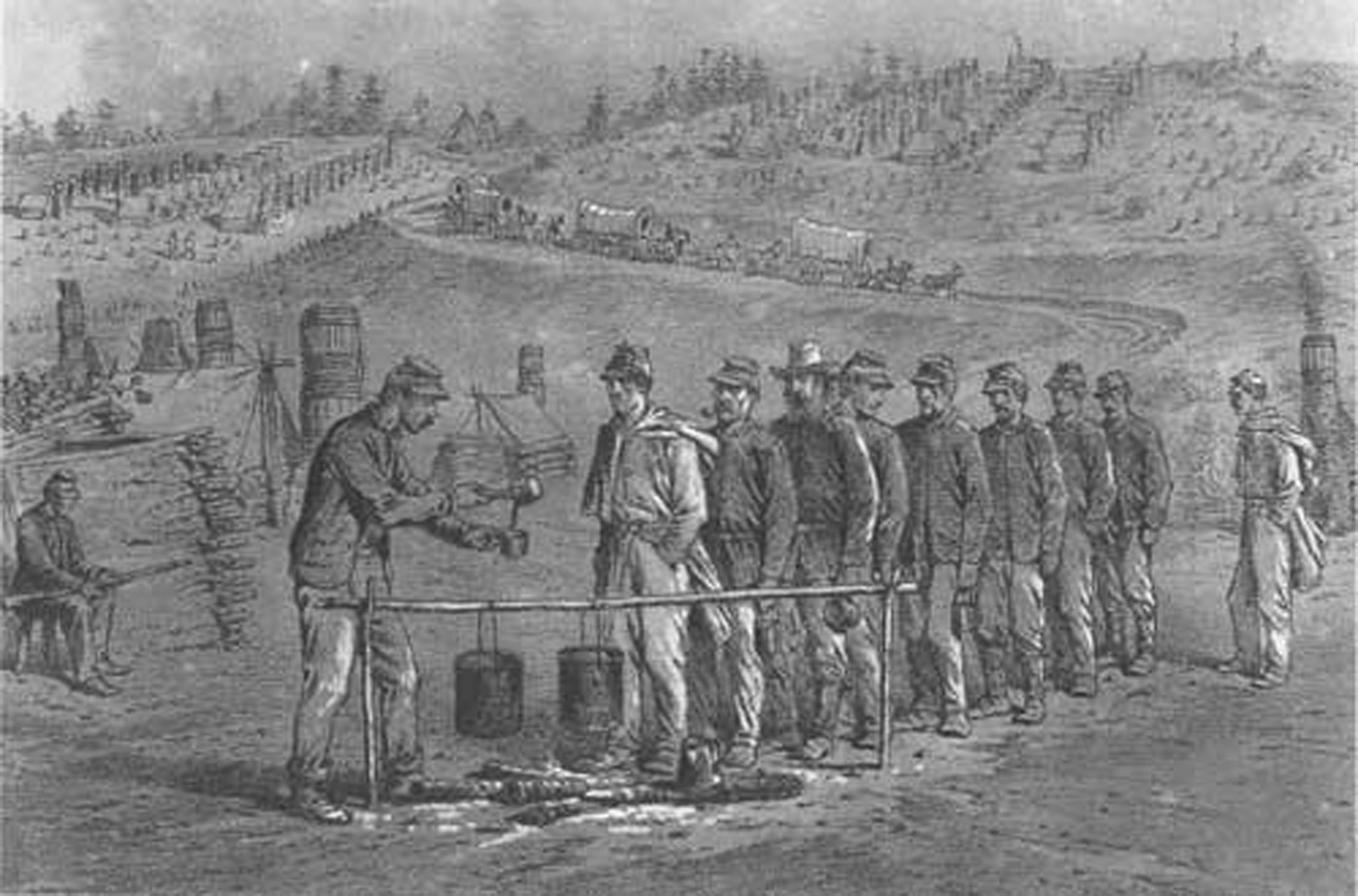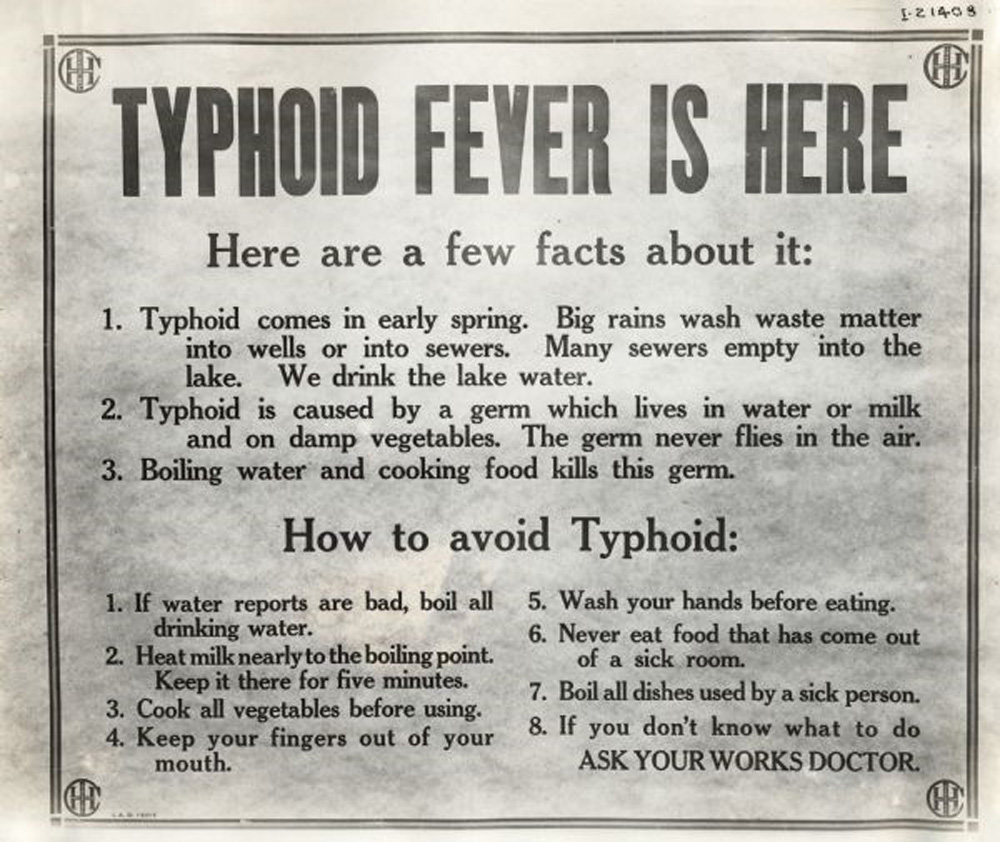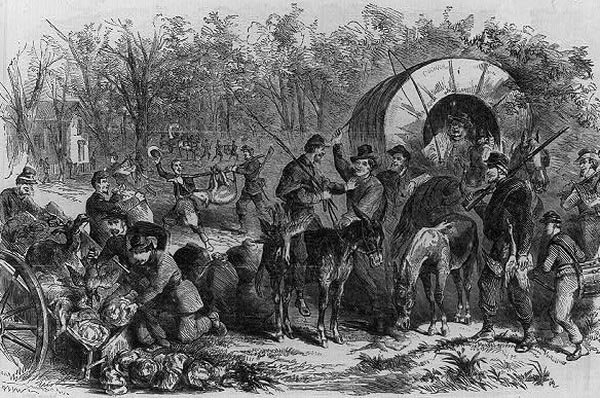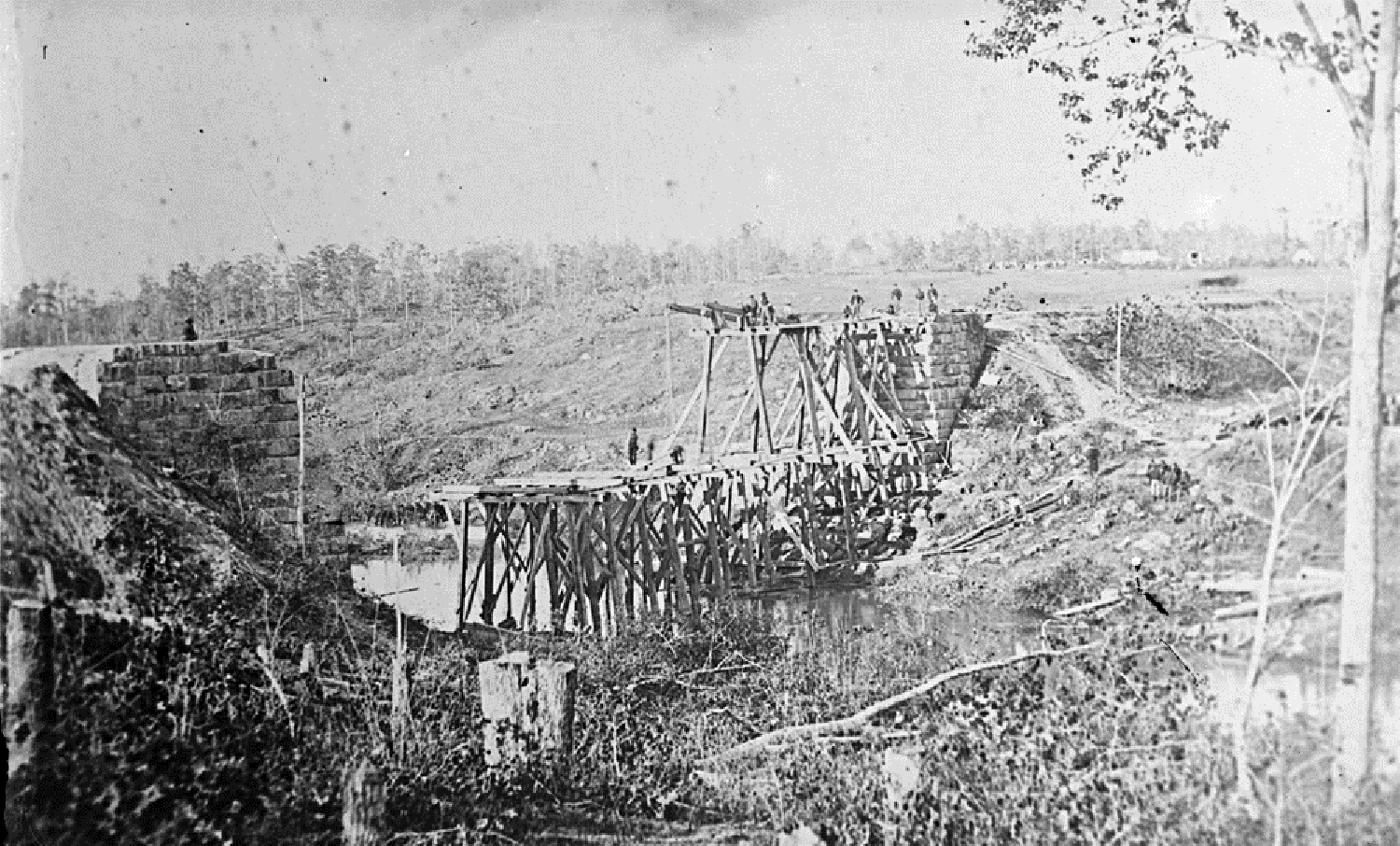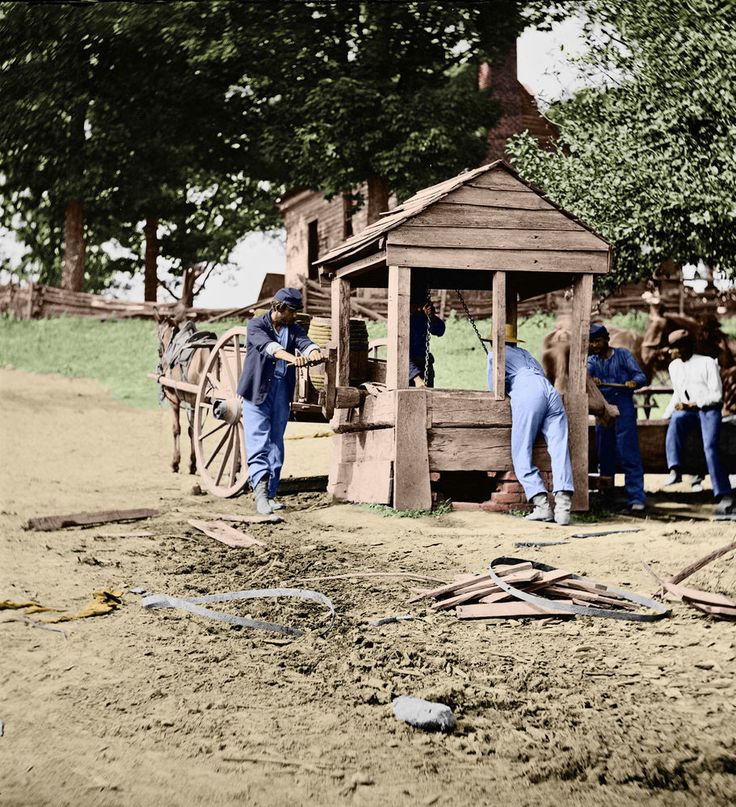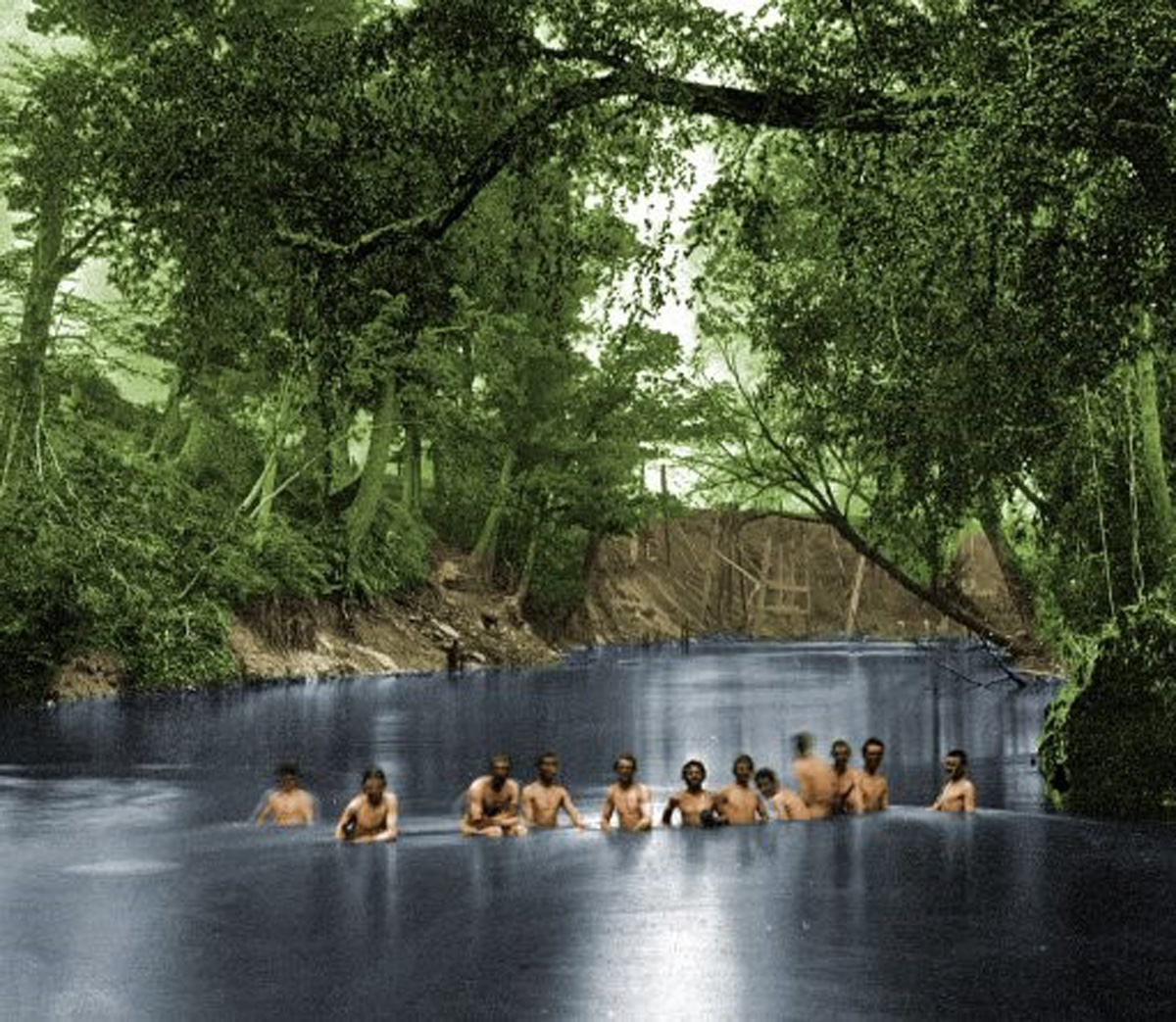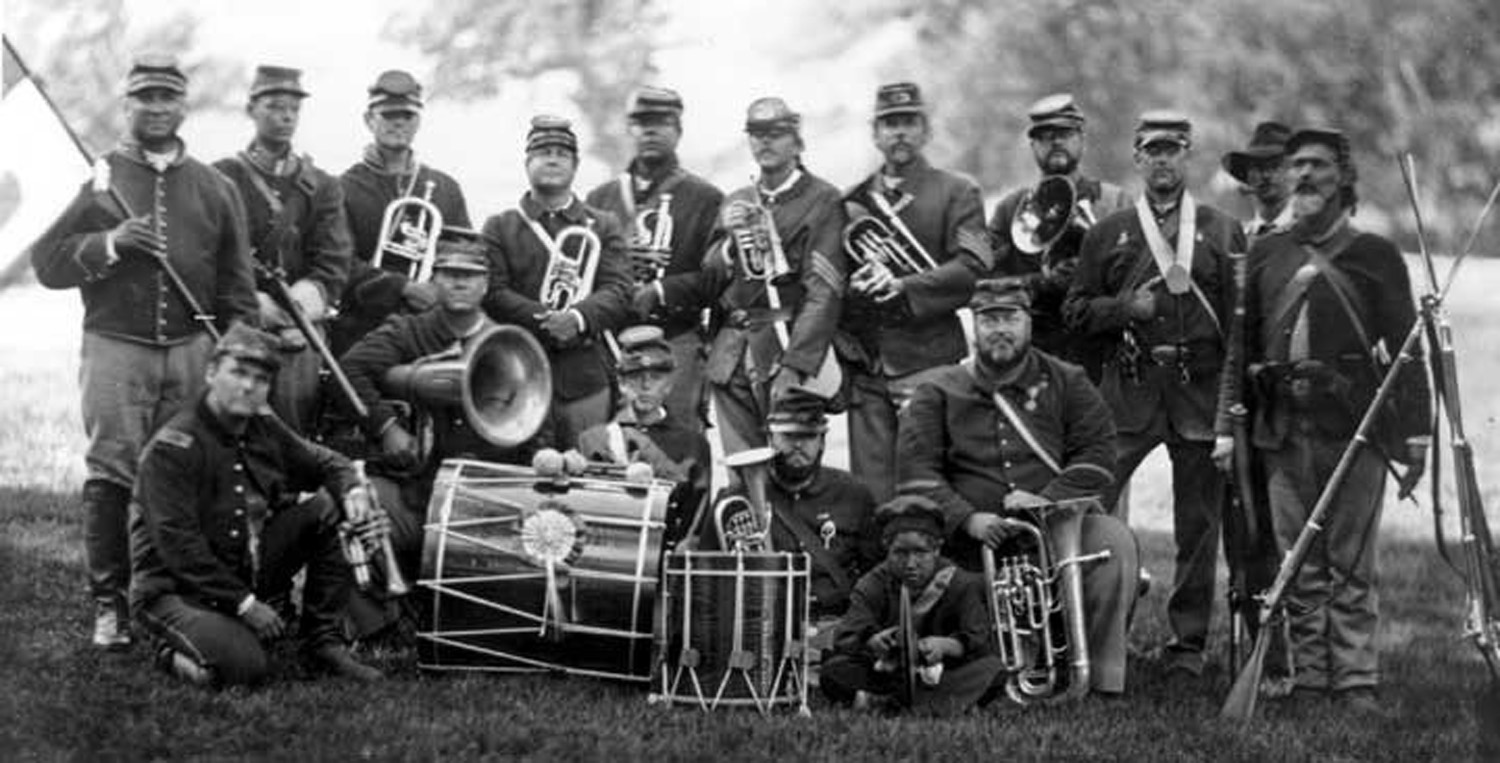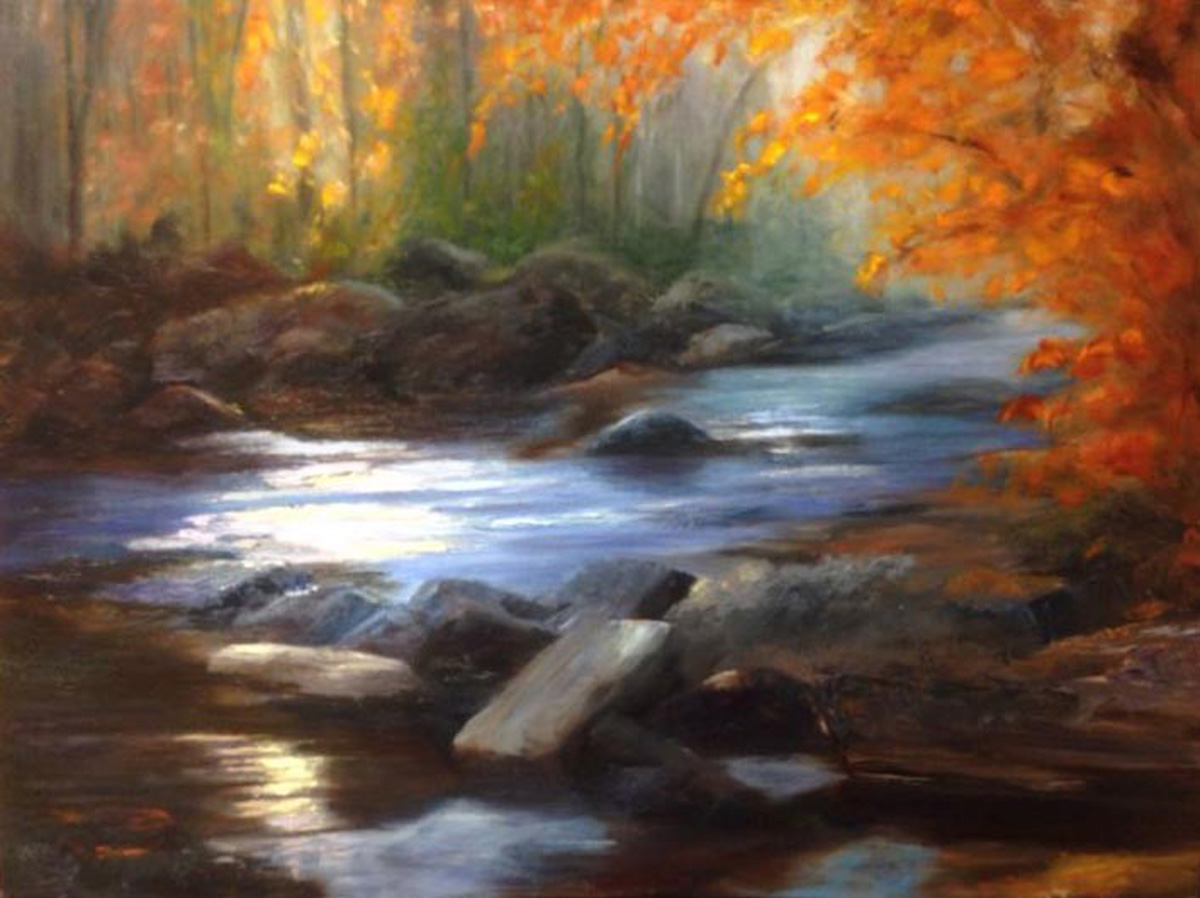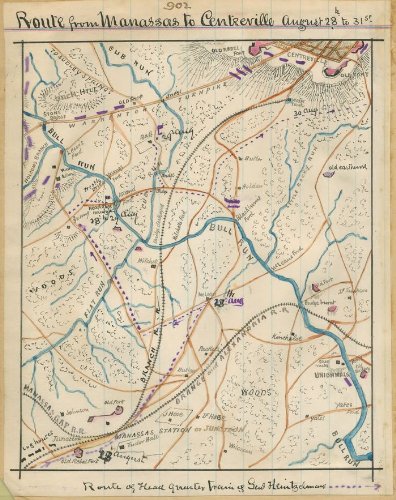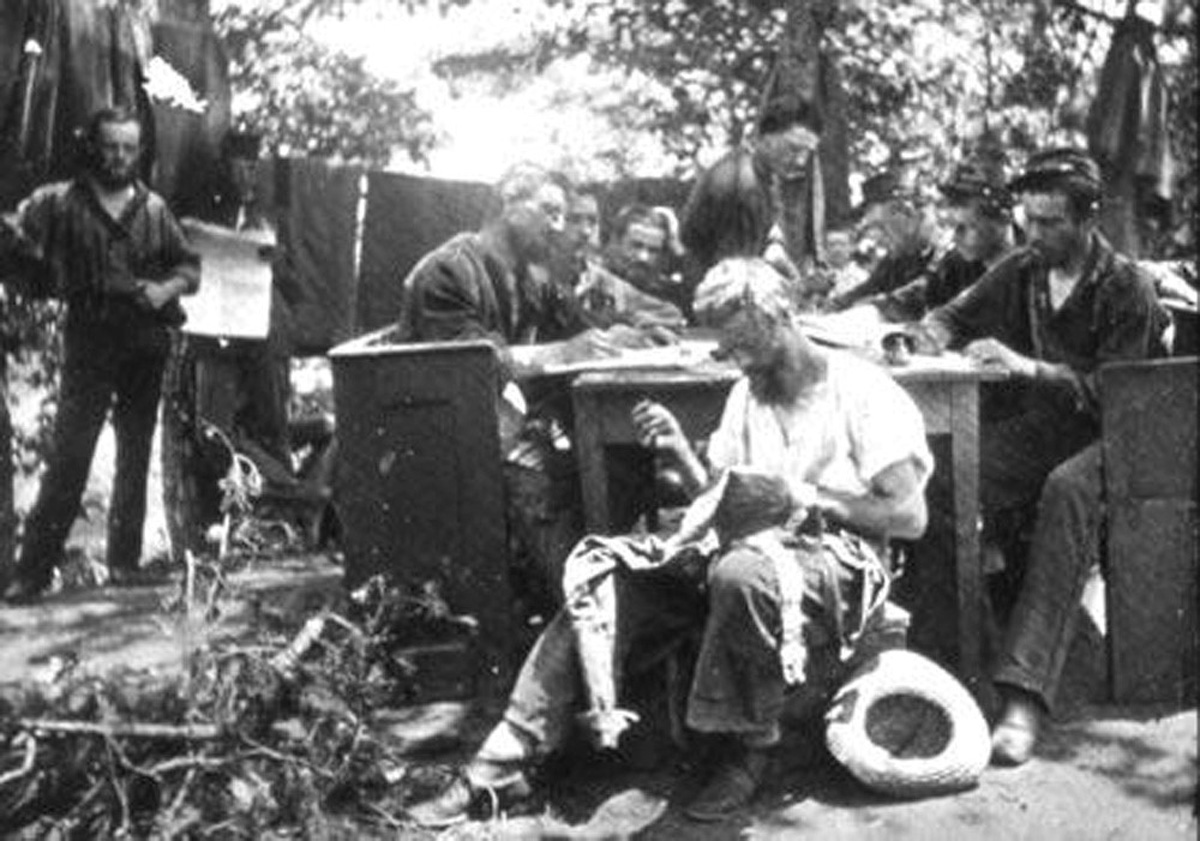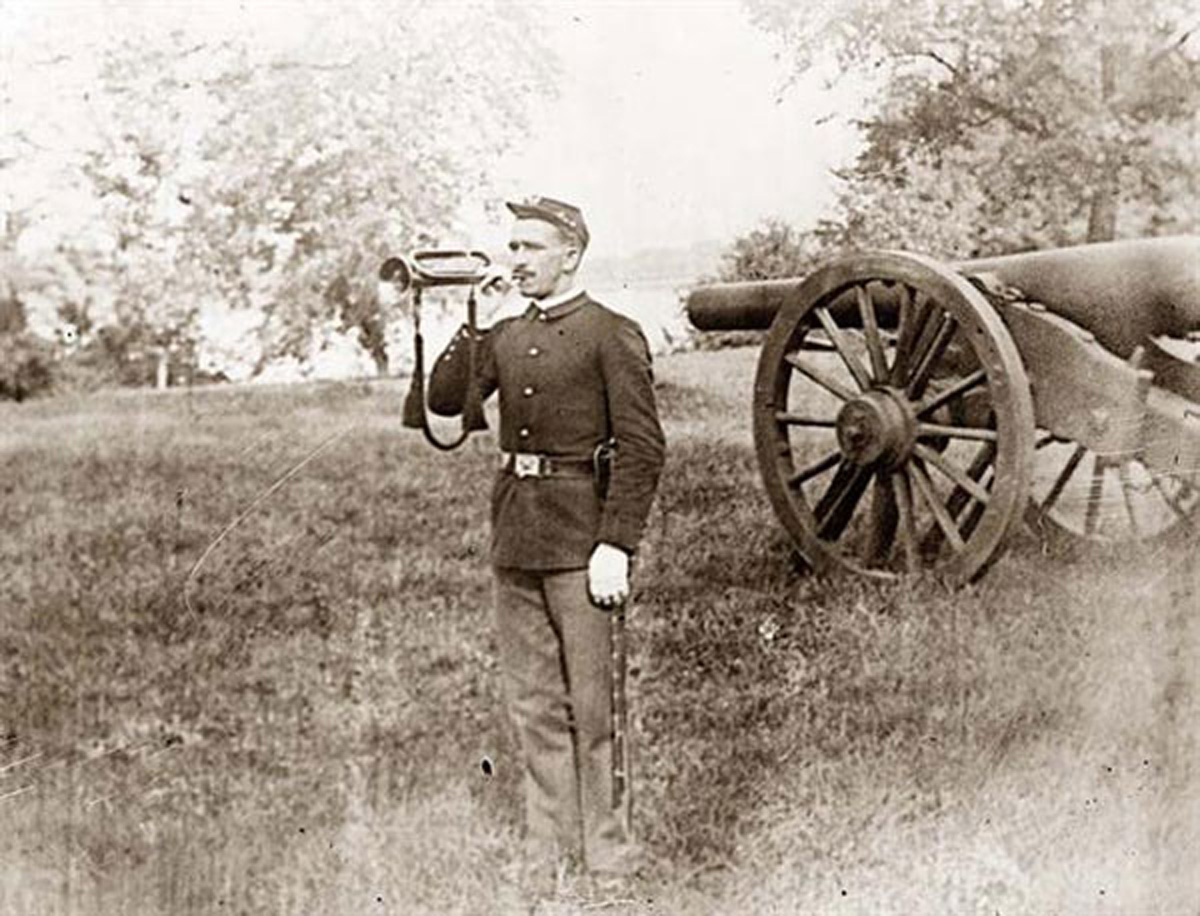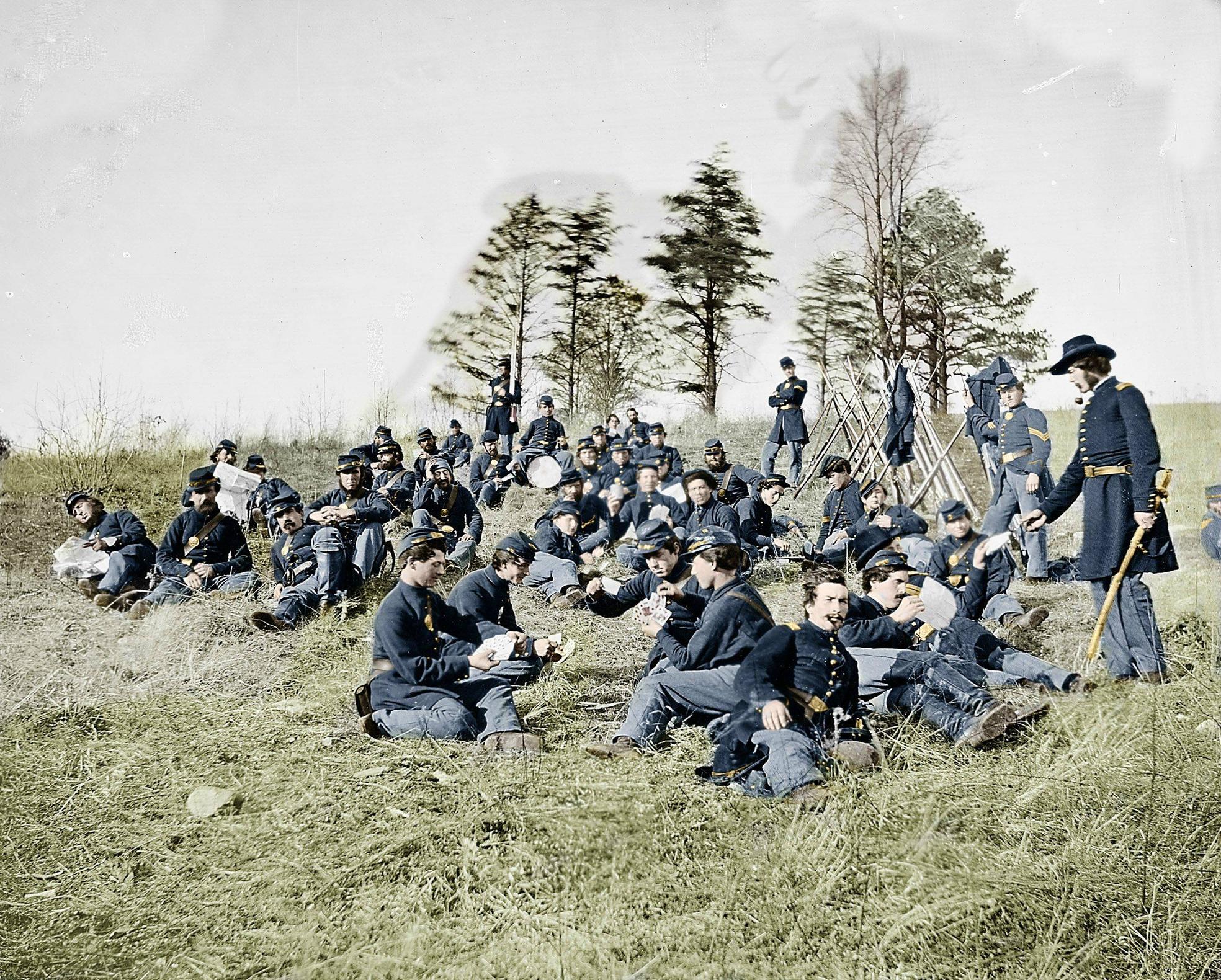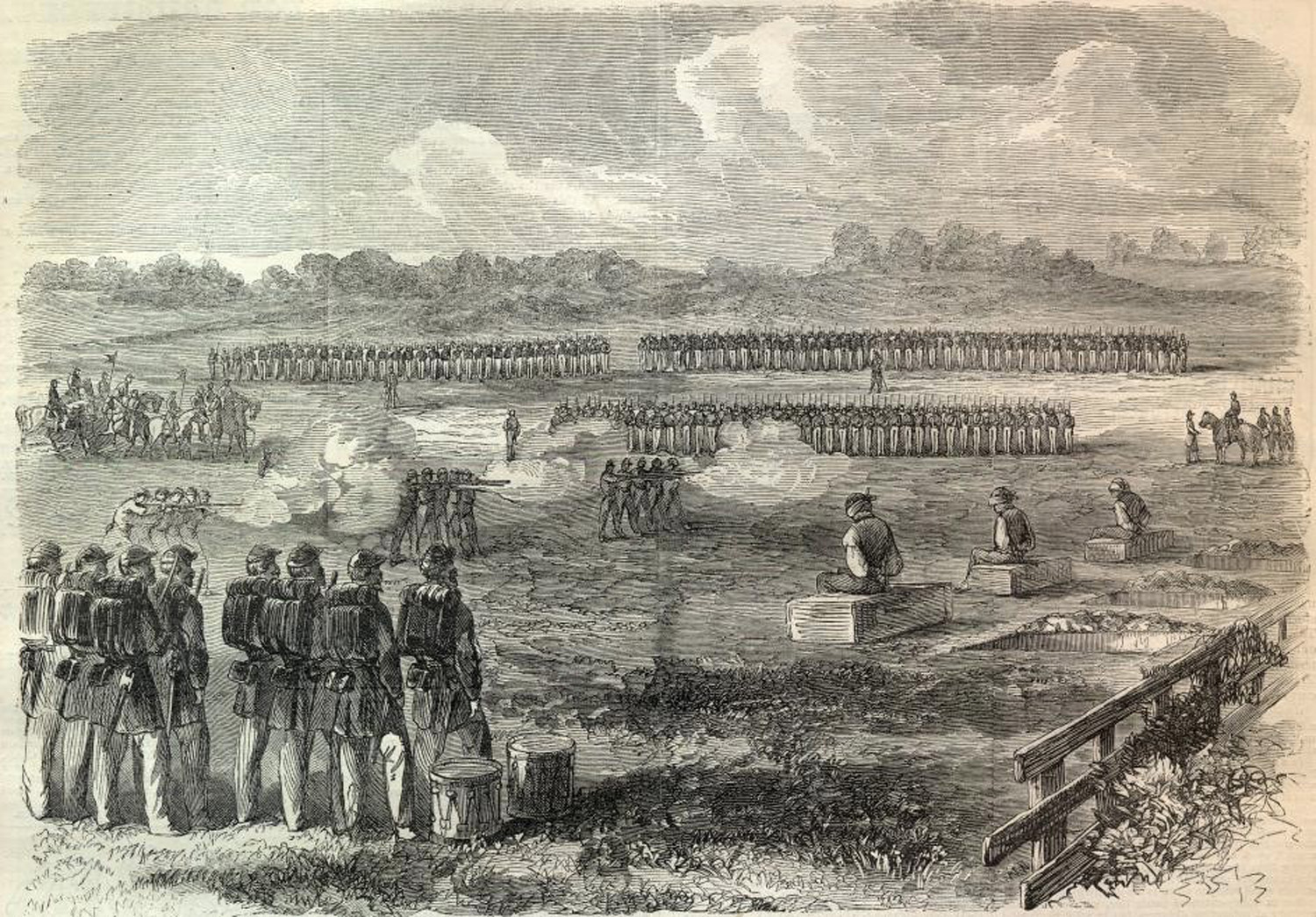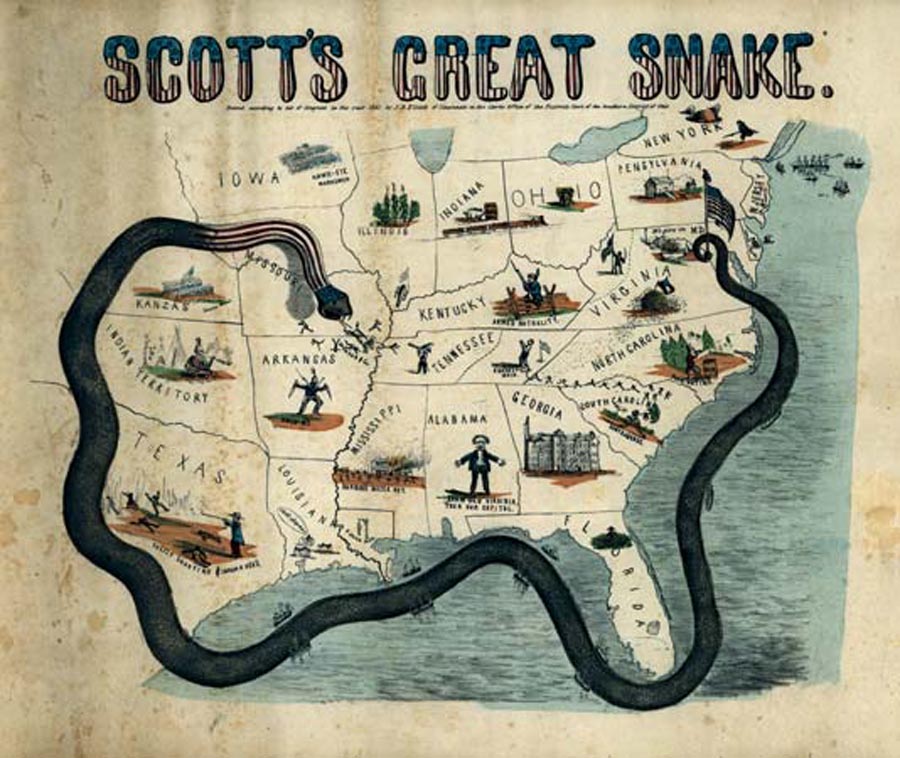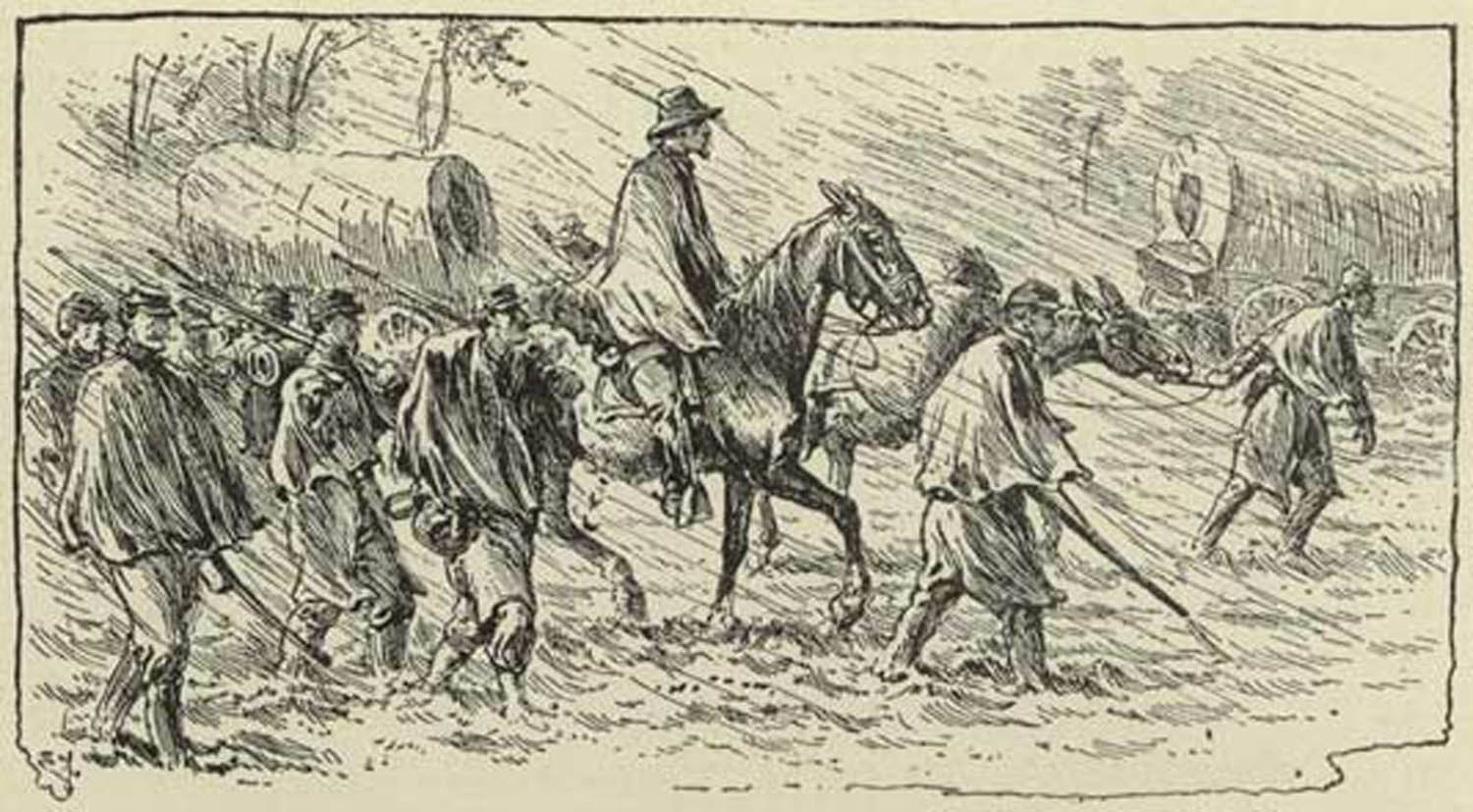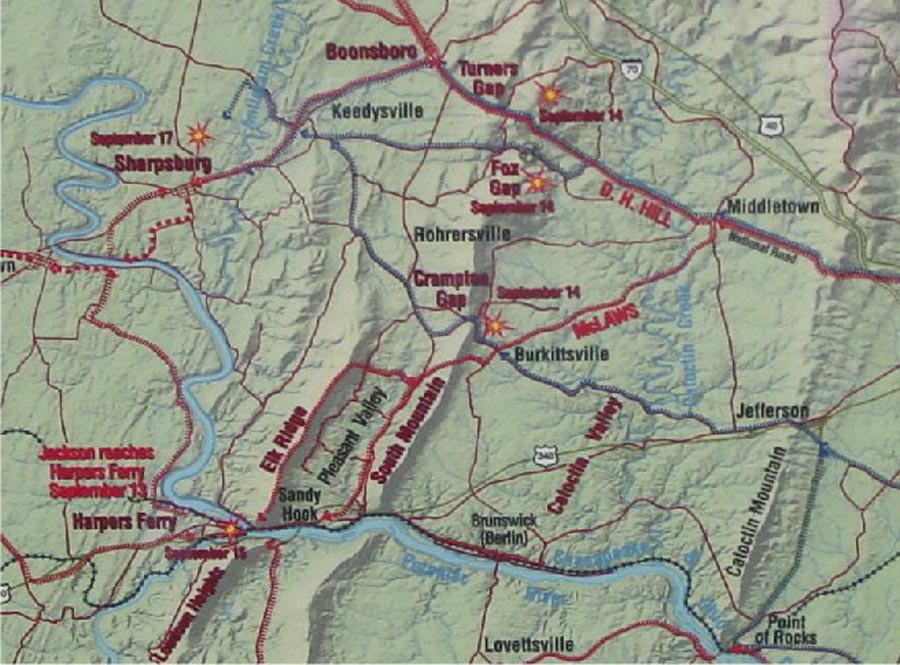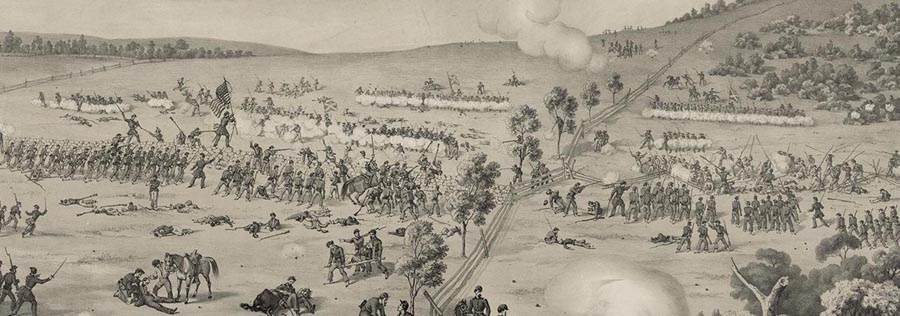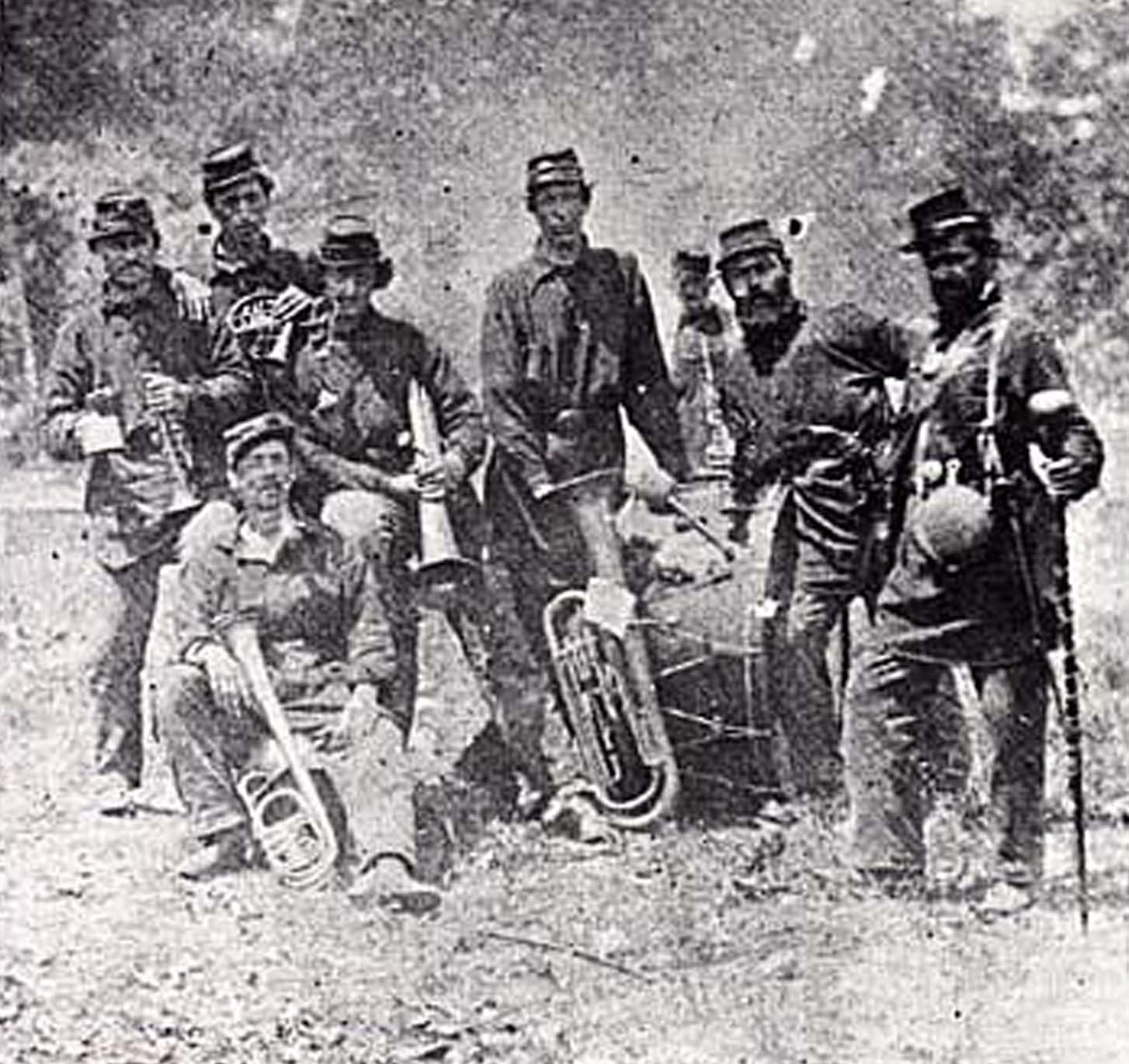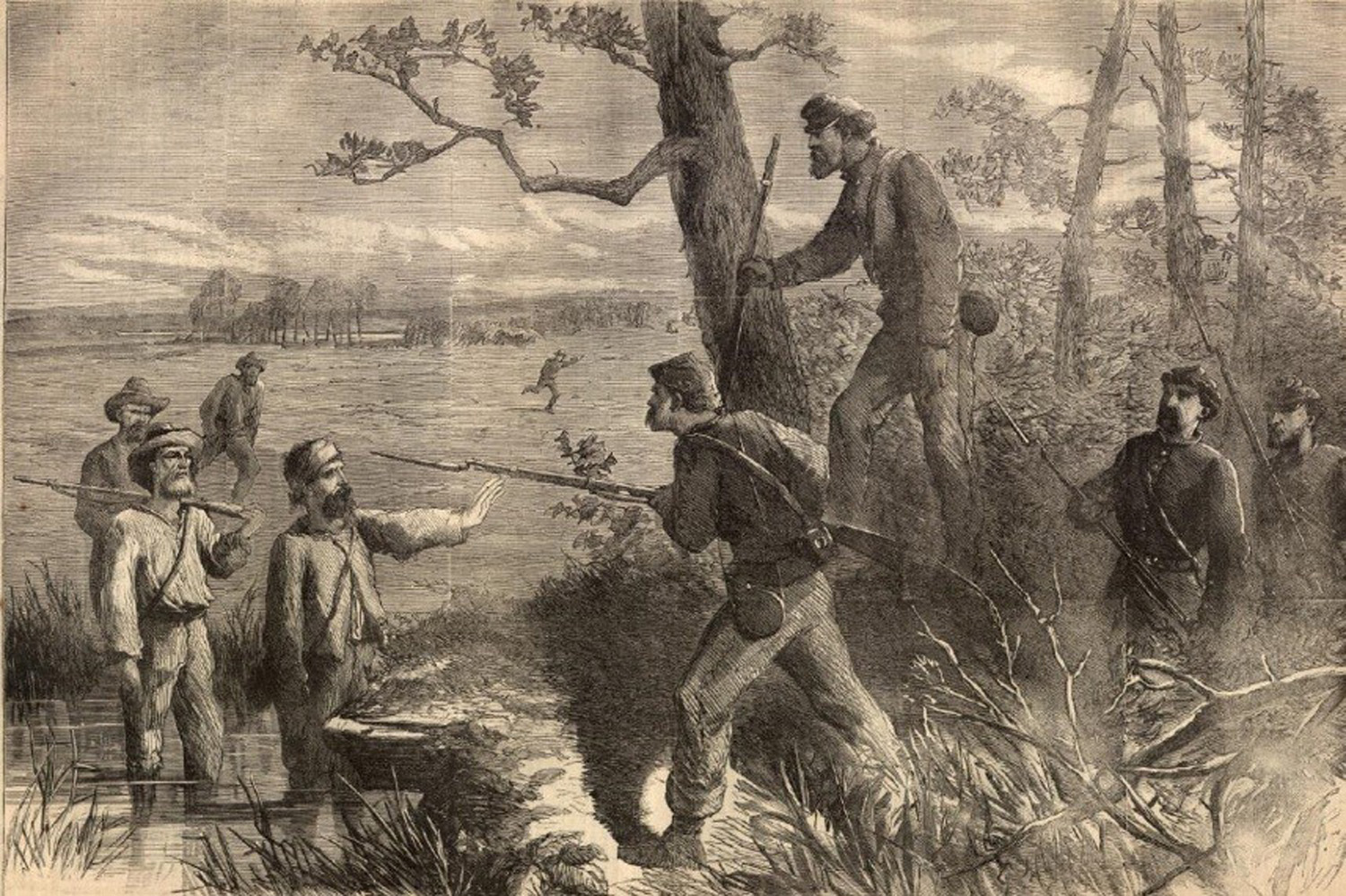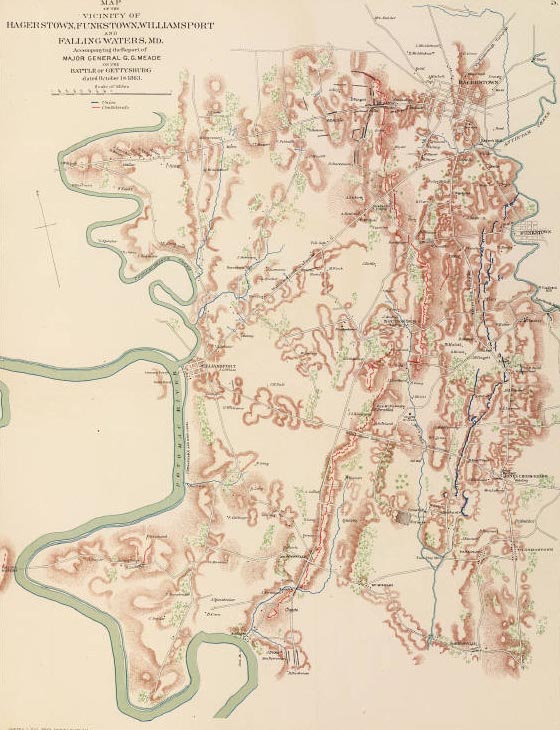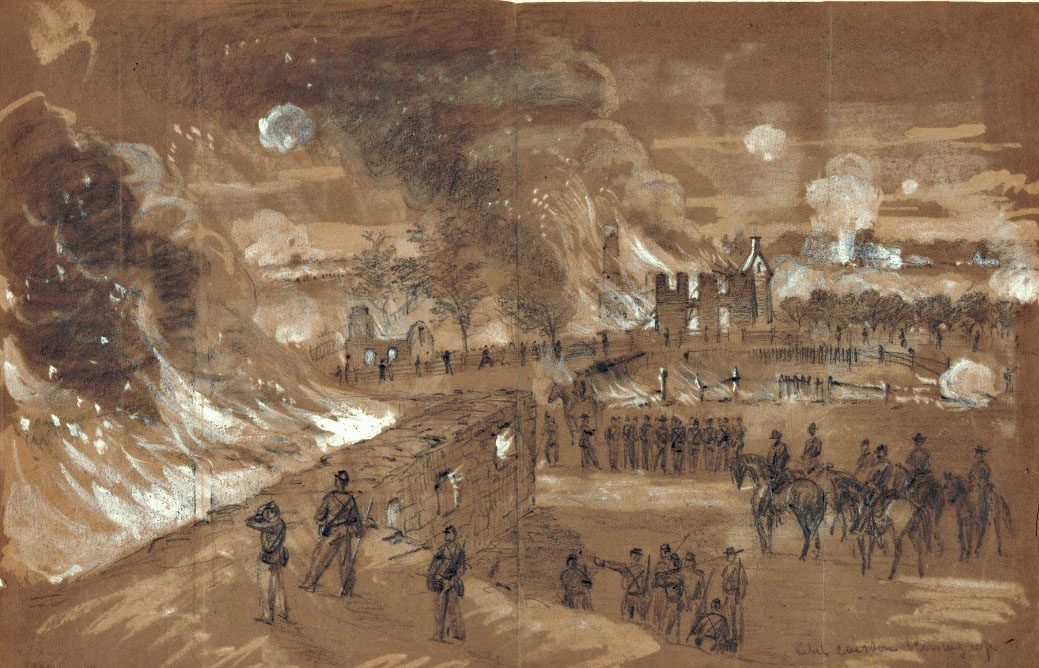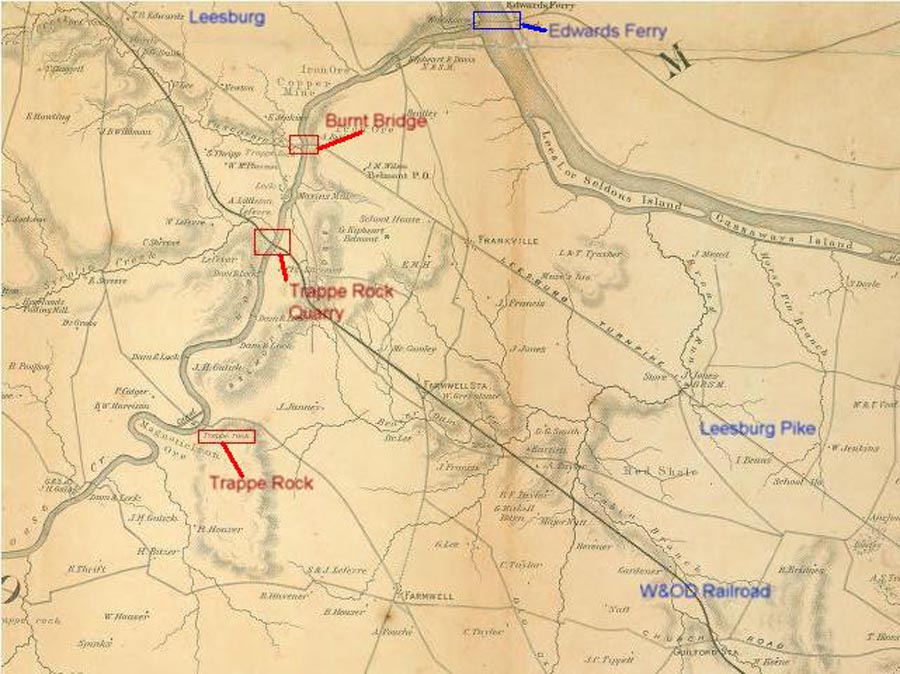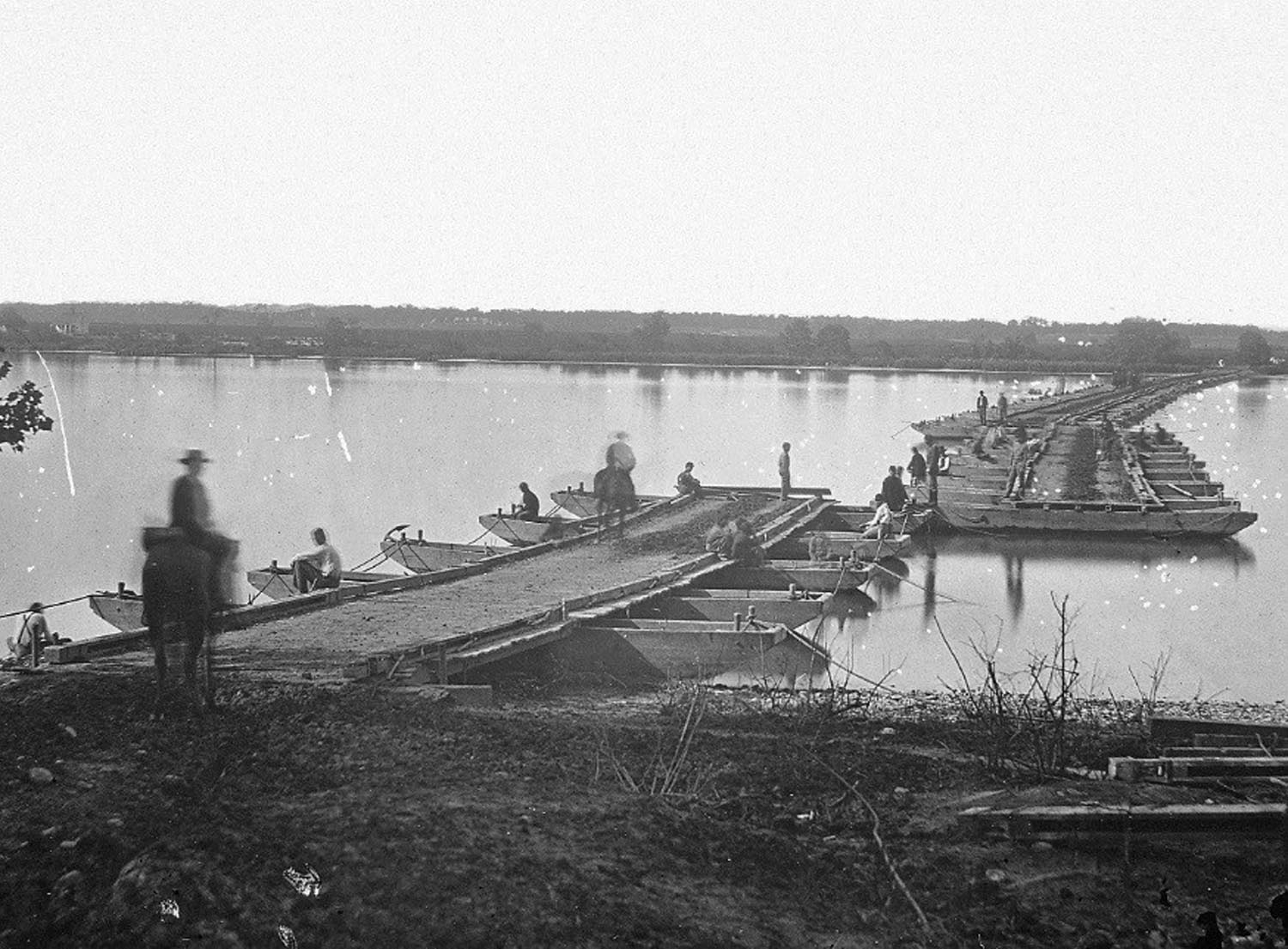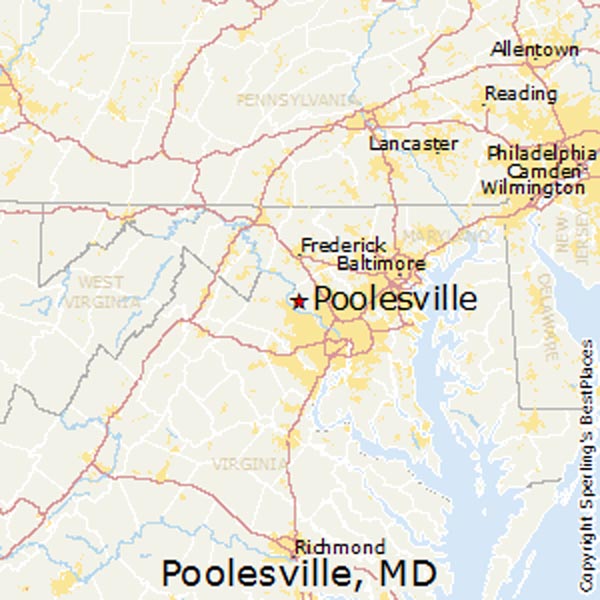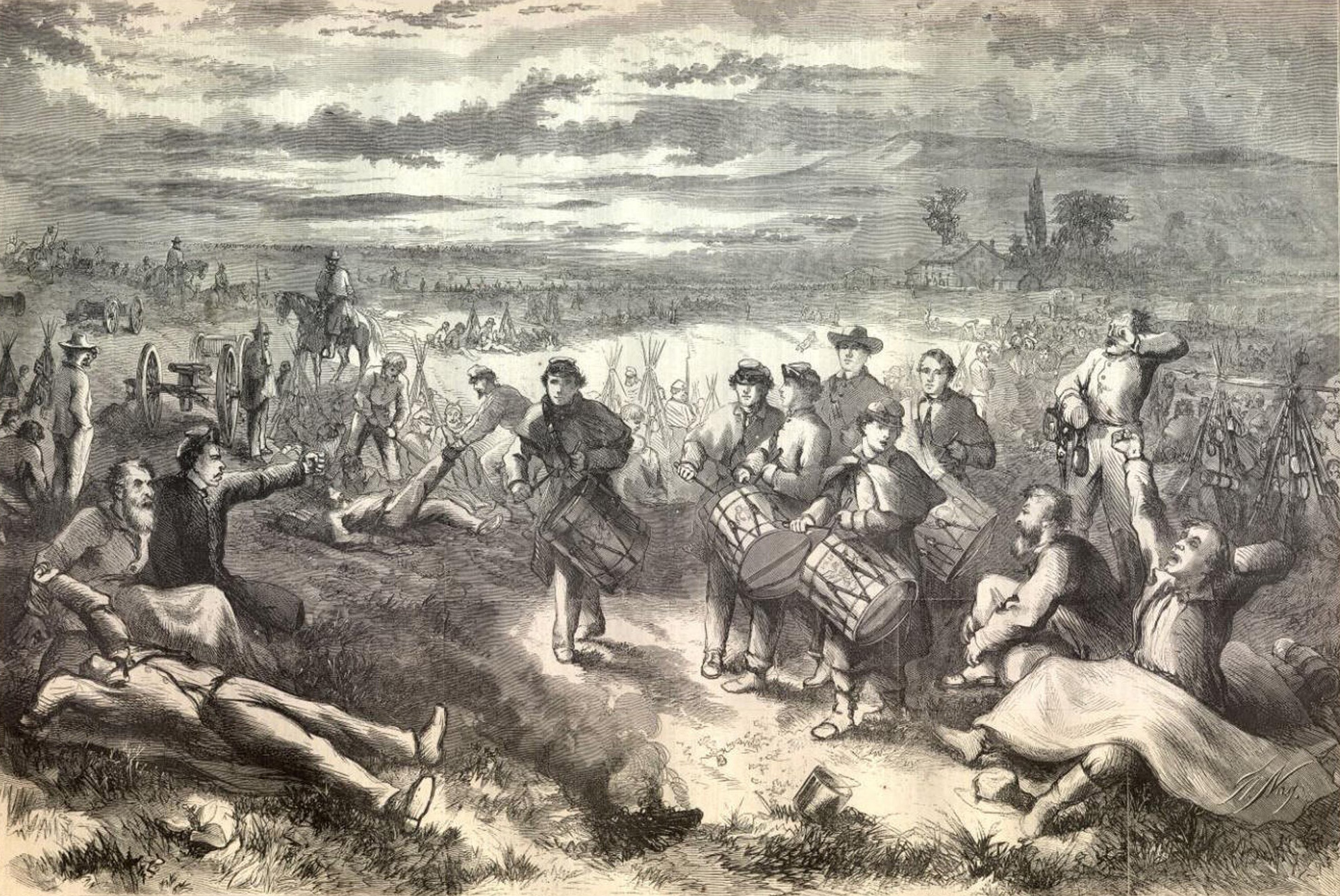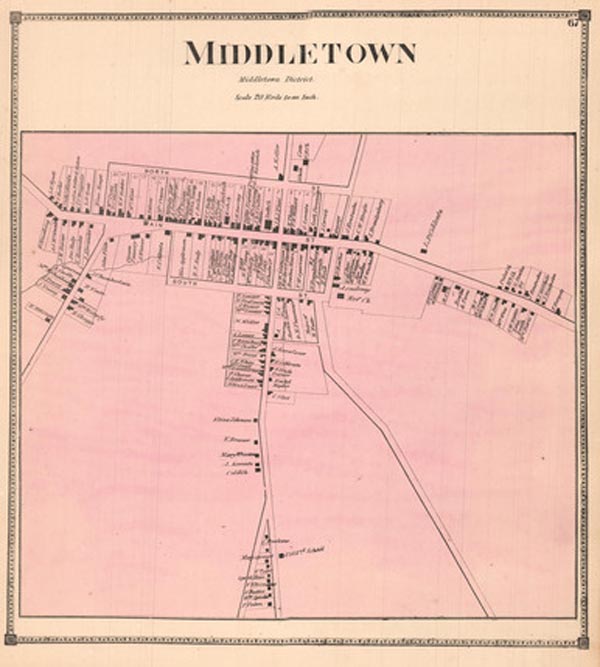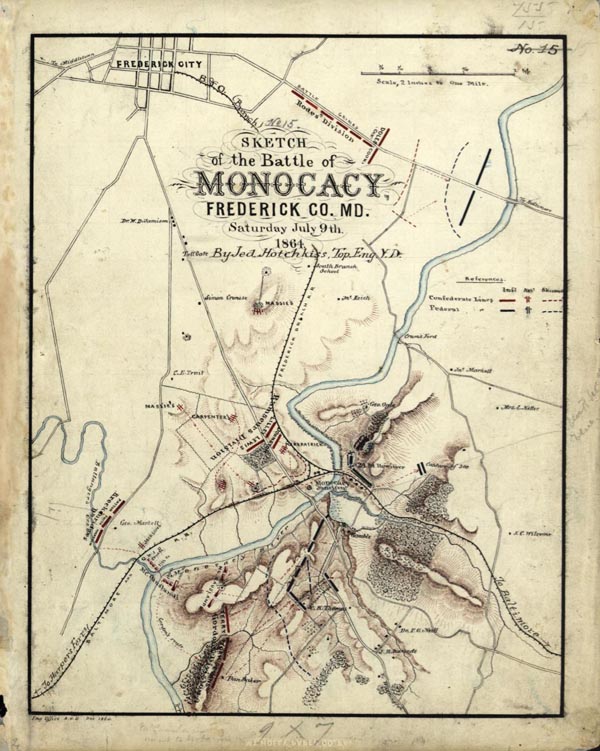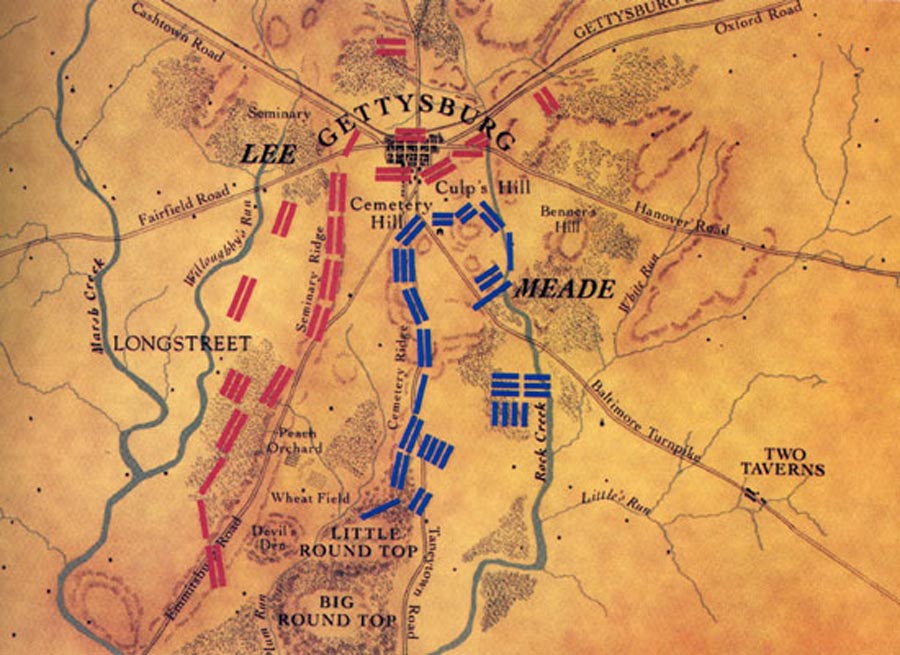the march to Gettysburg
David writes a postscript in his diary.
12th of June, 1863:
Today at about 2 o’clock pm, we commenced the famous march to Gettysburg. It was very dry for we had had no rain since the 9th of May. The dust was from two to three inches deep, and one could see the heat waves curl up from the dry roads about twenty-five feet, having the appearance of the sun shining on a piece of hot iron. The wells and springs were about all dry, and the creeks very low. The clouds of dust would rise about one hundred feet above us, and I was informed that these clouds of dust could be seen for miles
Union army camp
On arrival at the old Camp, near Brooks Station, David found his regiment had started on the march towards Gettysburg. He followed it up, hitching a ride with the baggage train and rear guard. The wagon ride was very bumpy, so he used his haversack to soften the ride. David had some time to rest and make an entry into his diary.
Gettysburg battle map
Each time he opened the book and began to write, he could still smell the scent of home in the wrapping. He touched his face briefly with the cloth, then put it away as if it had great value.
a baggage train
12th of June, 1863:
We went into camp about dark, and, oh, my ! Such sore feet as I had. When i pulled off my socks. . . .every toe had a blister, and on the big joint back of the big toe, the skin came off with the sock, as big as an old fashion copper cent. I did not stop to eat supper that night, but i lay down on my gum blanket with my overcoat for cover and was soon in the land of dreams.
night watch
13th of June, 1863
Reveille sounded at 3 am, and we left camp just at the break of day. There had been considerable speculation the day before as to where we were going. And as the road had been bearing toward the left, or south, the word was ‘left to Richmond ;’ when the road turned toward the right this morning, saying was ‘right for Washington.
the long road to Gettysburg
My feet were in a very bad condition. . . .after marching. . . .for eight or ten miles, two large blisters formed on the bottom of my feet about an inch wide and two inches long. I had to stop and open these blisters, and it was just like walking on coals of fire after this operation
ambulance corps
It was not long before David was getting into the rear. He got so far behind the columns that he finally found himself in the group of the ambulance corps. Reaching out his arm, he caught hold of a wagon that pulled him along three or four miles, and David was quite relieved.
the rear of the Column
The wagons passed soldiers alongside the road overcome with the heat and exhaustion too many to count. He saw several men that appeared to be lifeless just lying there, and no one was paying them any attention. Under the dark shade of a towering oak lay the lifeless form of a drummer boy, apparently not more than 17 years of age. He had a tiny frame, yellow hair, and blue eyes. As David approached him, he stooped down and observed a bloody mark upon his forehead. It showed where the messenger of death had produced the wound that caused his death. His lips were closed, his eyes half-open, but his face displayed a bright smile of contentment. By his side lay his tenor drum, never to be tapped again.
tintype of a Civil War drummer boy
14th of June, 1863:
I fear the march from near Falmouth heights, in Virginia, to and beyond the town of Gettysburg, will be a long and toilsome one. The heat frequently is so intense that many of the rank and file dropped by the wayside. Some men to report, later on, others are still resting alongside the road in the camp of the “unknown.”
collecting Union dead
Several months afterward, these men were gathered for burial along with those who had fallen in battle.
The men got off the road to look for water, for everyone was thirsty. One of the men came to a pond in a field not far from the road. But when the soldiers tried to drink it, they found it to be the worst water they ever had tried. It was covered with a thick green scum with a lot of big long-legged flies skating over it. The pond was about two inches deep and filled with young frogs. And the water was thick and smelled so strong that David was sure that he could not drink it. But the men needed water, so they all filled their canteens out of this pond.
David put into the canteen about two teaspoonsful of coffee to flavour it. He came up to his Company shortly after, and as he stepped into the ranks, the boys asked David, “have you got any water”?
“Not a drop,” was his answer, yet he still had about half a canteen of the stuff he had gotten out of the pond. But water was water, and he could not give it away. David drank it all before they came to water again.
a coffee break
The troops stopped to cook a cup of coffee at about noon. Here was a little stream of water not over one foot and a half wide and about three or four inches deep, clean running water. It was pure, but as far as David could see up the stream, the boys were washing their feet in it. And by the time it got down to him, it was pretty well flavoured. But this use of it made no difference to the men. They made coffee out of it, drank of it, and washed their feet in it. And as far as he could see down the stream, everybody was using it for the same purposes. It was the same old story, everybody’s feet needed washing, and as far as he could see up the creek, it was full of men, horses, and mules.
drinking water from a stream
On the night the regiment reached Winchester, there seemed to be a mistake about going into camp. The Brigade would halt and then start, possibly making a mile and then halt again. This movement would be repeated over and over again. A laughable incident was noticed while the occurrences were taking place. A soldier by the name of Jemison was a cook for Captain Howell’s headquarters. He had succeeded in getting quite a supply of fence boards to start his campfires with.
It was considerable load, and after the third order had been given “forward,” he threw them down in disgust and swore he would carry them no longer.
When “halt” was sounded, he went back and got them again.
No sooner had “forward” been ordered again, when down he threw them. And for several minutes, the volume of epithets that poured forth would not have been suitable for the uplift of Christianity.
During a long “halt,” the men took off their packs and set on them to rest. David took out one of his pencils and begin to take notes in his diary:
No date:
My shoes have become literally worn out ; the bare skin being exposed. During the march of the first day we passed through grain fields. In one of them the grain had been cut and removed, and the ground was what the farmer calls a stubble field. I, with my exposed feet, ran ahead of the rest of the men, like as if the rebels were close at my heels. Figuratively speaking i saw stars in broad-day-light
Union soldiers on the march
The order “forward” came, and David put the book back in his haversack, but before he could fall in line, the order came again to “halt.” Along with the other men, he sat down again and continued to write down his thoughts.
No date:
By the power appointed to me by god to watch over the interests of my family at home and to sustain the army in the field, both by marching with men forward, and by protecting those from the slanders of traitors, and the lying tongues of misnamed friends, I take the liberty of giving a truthful account of the doings of the one hundred and fifty-third regiment, Pennsylvania volunteers.
On the march to Gettysburg Comrade King was attacked with typhoid fever, and with many other sick men, they were advised to go home. Though still weak from his illness King started for his home and on the way in the darkness was overtaken by a man on horseback. He was a farmer who happened to be a neighbor of David’s parents. On speaking to him to his great joy, he learned that this man was Charles Long. Mr. Long instantly dismounted and placed the soldier in the saddle and accompanied him to his home. The joy of the family was indescribable, and all sleep was suspended for the entire night.
typhoid fever health announcement
Typhoid fever is an intestinal infection that is spread by ingesting food or water contaminated with the bacteria, Salmonella Typhus. Such contamination was usually widespread in army camps and caused massive epidemics. During the Civil War, there were 75, 418 cases in the Union Army, and 27,058 (36%) of them died. Far more soldiers died of typhoid or dysentery than of battle wounds.
Entry in David’s diary.
15th of June, 1863:
I bought a pair of woollen socks from one of my comrades for fifty cents on credit, for we had no money. I do not remember now whether I ever paid for them, but I promised to do so, and that is good enough for these days. By the time I got my feet fixed up, the bugle called for us to get up and travel. I started with the regiment and kept up for some time, but I had to frequently stop to fix up my feet. By the operation on their bottoms and under these circumstances got away to the rear of my regiment into the wagon train.
the supply wagon train
Over half of the men were barefooted, and many were lame and were sent to the rear. Others, of sterner stuff, hobbled along and managed to keep up, while gangs from every company went off in the surrounding countryside looking for food.
looking for food
Many became ill from exposure and starvation and were left on the road. The ambulances were full, and the whole route was marked with a sick, lame, limping lot that straggled along.
marching on
By degrees, David caught up with his regiment about a mile before it reached camp. The Company was on Cedar Run when he came up, and all the men gave out three loud cheers as they always did on his late arrivals.
Then the men sang, “for he’s a jolly good fellow” as they approached their destination.
Federal soldiers rebuilding the bridge over Cedar Run
The Company was just starting when a big fellow by the name of Benjamin Mann and another man dropped in the road with sunstroke. They both were carried out under a shade tree, and the doctor called. But before he made it there, the other man died. No one could identify him, and he carried no papers that would tell them who he was. He was left right where he fell beside the road as another unknown soldier. Benjamin was with the regiment again for a few days, but later, he was killed at Gettysburg.
Battle of Cedar Run
The columns made thirty miles this day. It was on a wager with the 2d Brigade. Brigadier von Gilsa had put up three hundred dollars that the 1st Brigade could out-march the 2d. An incident happened on the march. The company came to a well, which had an old-fashioned oaken bucket and windlass. The crowd around the well was about two rods deep, and every man was “as dry as harvest hands.”
David worked his way up through the group and came behind a big fellow by the name of Wolf, who belonged to Company D. He looked over his shoulder and said to him. “hang on to me Davie.”
With his tin cup in hand, he got hold of Wolf and held on to his waist with both arms. Wolf got hold of the bucket as soon as he could reach it. Three men on the other side of the well got hold of it the same time Wolf did. He got the bucket and two of the men on the other side came very near falling in the well.
Civil War water well
David’s tin cup now was full of dust, but it was the first one in the bucket. Now to get the tin out of the bucket full of water was quite another thing. All that could, crowded their tins on top, and by the time he got his out, it was only a half cupful of dust and water. The bucket had fallen to the bottom of the well, so the boys went marching on. David and Wolf did not get a drop of water for their trouble.
The 1st Brigade was in camp about one hour before the 2d arrived. General Gilsa made a beautiful little speech to the men congratulating them on their exceptional marching qualities and thanking them for making the distance in a short time and beating the 2d Brigade. The pencil was put to paper as David wrote in his diary.
15th of June, 1863:
After supper (coffee and hard-tack)—i went down about one hundred yards through a nice meadow to take a bath. I thought I would return to camp in my bare feet, but i could not walk, so i got down on my hands and crawled back to camp…
soldiers taking a bath
16th of June, 1863:
Reveille sounded at about 5 o’clock. After breakfast of coffee and hard-tack, a rumor came through camp that this was Sunday and that it would conflict with General Howard’s
Religious principles to march on Sunday. I, for one, was wishing that the general’s religious spell would last all day, but by ten o’clock a. M. The bugle sounded calling us to get ready to march.
reveille
While the company was packing, Chunky and the band gave them lots of music. But music had minimal effect on the troops, for they were too near dead from fatigue.
An anonymous voice in the crowd yelled out, “If I had been offered ten thousand dollars this morning to march ten miles, I would have refused it.”
the company band
After the music, came the old familiar command, “fall in.” But the boys did not get up and fall in. Instead, they answered the call-in language that best not be repeated. The officers could not get the men started. Finally, the old Brigadier General von Gilsa gave the command in his strong vernacular (full of expletives), which had the desired effect of getting the army in motion. On account of the condition of the men, it was almost impossible to move them. The entire company rested at the end of the first half-mile, the next rest coming at the end of a mile. Now able to make a few miles, they began to get warmed up, then there were no more stops until they came to Broad Run.
the Broad Run
Entry in David’s diary.
No Date:
Being behind when the rest came into camp, I told the doctor that I could not go any further. Dr. Stout told me that when the column started, I should drop out and he would give me a pass for the ambulance and that he knew that I was. . . .not able to keep in ranks.
It was not long after the men left camp, the drinking commenced, and they drank all the water they could find along the road. It made no difference to them whether it was good or clean, only so it was wet. The weather was hot and drinking so much water caused many poor fellows to fall by the wayside. David came along where they were burying men who had died from the effects of drinking too much water.
No date:
I did not know how soon our time would come to go hence. We got to Centreville Somewhere between 8 and 9 am, and I was not long finding a spring, with a crowd about three rods thick. I crowded into the spring. By lying down, I could reach the water, could get about one-third of a tin full at each dip, and got my canteen full of mud and water.
the route to Centerville
David got out of the crowd and came up to the village. There he saw another well with a wooden pump in it. He was the first and only man to find it. There David met a boy about ten years of age at the well. He said, “let me fill your canteen.”
David told him, “let me see some of the water first because my canteen is full of spring water. Such excellent water I have not seen for many a day”. David told him he might fill his canteen and he went to work at once.
The boy commenced to pour out the contents—mud, water, coffee grounds, lemon peels and the like. It was truly laughable to see the look of astonishment on the lad’s face as he saw the contents of the canteen. David left with his tin cup, coffee kettle, canteen, and himself included full of that good water, and he left the boy with a soldier’s blessing.
In the street, David met Doctor Stout and asked him if he would like a drink of well water. As he emptied the tin cup, he asked, “where did you get this water?”
David pointed to the well, and he went and filled his canteen also. Some of the other men found a meadow near a beautiful spring, so they moved their camp closer to the water.
It was on this evening that Colonel Glanz arrived, returning from Richmond Libby prison. David knew personally what kind of treatment the man had been exposed to. The men all turned out in their stocking feet to greet the Colonel. He made a speech to his comrades and dropped a few silent tears. The old man had changed since they all had seen him last. He was quite corpulent when he was with them before, but when he got back, he was just about as thin as a rail. After he joined them, he went with the regiment a few days but did not take command, claiming he was not well.
writing letters home
The men went back to their tents and spent the evening writing letters home. David helped several comrades keep in touch with their family by helping the men that could not read, write letters. After he completed this service, David opened his haversack and took out the scarf package. He made himself comfortable and wrote in his diary.
17th of June, 1863:
On the 17th, as I arose, a comrade of mine by the name of Henry Zearfass was still sleeping. I aroused him and told him to get his breakfast as there was a hard day’s march before us. He told me his commissary supplies had run out. I took my cap and went around among the boys and soon had it full of coffee, sugar and hard-tack which filled his haversack for him. He was a nice young fellow, he had been wounded in the face and he had no cheek. He would starve before he would beg. After breakfast, while we were packing up, my tent-mate had a nice piece of bacon, and he said to me, “David, I am going to throw this away I can’t eat pork anyhow.” I told him to give it to me I would carry it; for I thought the gentleman would eat pork about noon. And I was right.
The company left Centreville about 4 a. m. They had made five or six miles when a halt was made, and this brought the troops to a house. There were three men at the home, one had a bandage around his head, one had his arm in a sling, the other was lame. The boys accused them of being Rebels, and they denied it. David and some of the other men were leaning against the garden fence. In the garden, there was a small bed of onions. With a little help, the fence fell over, and there was a mad dash. All he got was two onions as the bugle sounded for them to fall in.
company bugler
As the company got in line, David looked down across the meadow. He saw some of the Germans soldiers going after a drove of geese. They were using a long pole with which they were knocking the heads off the geese. This was to him a new way of killing geese.
After marching a few miles, the column came to a little creek. Here they were ordered to fill their canteens. They were told they would not again find water for twelve miles. They kept in ranks for about ten miles. The water had given out, the sun was scorching, and David commenced to get sunblind. He had to join the other men sitting under the trees. Sometime later, after getting some rest and relief from the heat, David again took out his diary. He quickly jotted a few lines before the men were back on the march again.
No date:
I told my tent mate Chunky I would drop in the shade a few minutes, and he said he was with me. We stopped about fifteen minutes then went on. The road was lined with men who were occupying every shady place.
Union soldiers taking a break
The column marched through the fields and came to a wood road. Chunky told David, and they both agreed that the going was better on the road than in the fields. How far they tramped in the woods was anybody’s guess. But they all did know; the pickets were nowhere to be found, and their guides were hopelessly lost.
a wood road
The problem was simple. The column had passed through their own picket line, and it was not safe to return that way in the darkness. Chances were that somebody might get hurt. They had no way of knowing where the Rebel army would pop up.
Orders were given to the men in a whisper, “make yourselves as comfortable as you can and no noise about it.” The officer’s tone of voice reminded David of his own mother’s way of getting him down for the night.
But, at this time, in this place, he knew no one would be tucking him tonight, and he hoped, especially not Johnny Reb. Undercover of their blankets and each leaning on the opposite side of a tree, Chunky and David were soon fast asleep and did not wake until the break of day.
The two men were not wakened by the sunrise, but they found that they had spent the night in two inches of water. They were both wet and cold. It was not the first time for either of them sleeping in a mud hole; it was nothing new.
Chunky brought a smile to David’s and the other men’s faces when he chuckled in a fake southern accent, “yawl, this is the first time since we started this here march that I have moe water than I needed.”
The laughter spread across the awaking men like a wave until the officers quitted then down. They still had a good chuckle anyway, and they all felt a little better if only for a moment.
Now there was enough light to see through the morning mist that still clung to the ground, so the men started back towards camp. As far as anybody could figure out it was about two miles back just at the edge of the woods. They soon came into the picket line that some of them were supposed to relieve that evening before. The reception by the pickets was mixed with a good deal of profanity. The men on guard all night were silenced by informing them of how bright they had been to allow three hundred men to pass through their lines unobserved. Then the pickets were relieved.
During the time solders spend on the battlefield, there are moments of great excitement and long periods of boredom. Both of these experiences have a diminishing effect on men’s morals. Several of them became restless, and all were thinking about home. Even though David now had the free time, he did not always want to write down his memories. Somethings he just tried to forget. But when the inspiration came to him, he wrote.
No date:
Nothing occurred during this time except we were ordered to fall in one afternoon, and were informed that three deserters were to be executed in our camp that morning. I was very glad that I did not get chosen for the firing squad. Even though it is hard to fire on the enemy, it would be very difficult to fire on one of our own men. I know two of them personally but never met the third man. I wonder what their families will think? I don’t see much in it only that such was the doom of deserters, and i supposed was intended to give us a pointer not to desert.
the execution by firing squad of three Union deserters: wood engraving from
an American newspaper of 1863.
In the morning before the other men awoke and still under his blanket, David put his feelings to pencil.
NO date:
…Wet to the skin…rain high wind… cold…
Soon he could hear the crackling of a small fire, and he was sure that was hot coffee he smelled. But to his disappointment, it was Louisiana chicory they had confiscated from the rebs brewing in the pot. During the American Civil War, Louisianans looked to adding chicory root to their coffee when Union naval blockades cut off the port of New Orleans.
Anaconda plan proposed by Union General Winfield Scott
With shipments coming to a halt, desperate New Orleanais looking for their coffee fix began mixing things with coffee to stretch out the supply. Acorns or beets also did the trick. Though chicory alone is devoid of the alkaloid that gives you a caffeine buzz, the grounds taste similar. And they could be sold at a lower rate. So after a cup of hot chicory, poor man’s coffee, he continued writing in his diary.
No date:
It rained all night, and we were wet to the skin, spent a miserable night, and after the usual old bill of fare in rain and high winds. The command came to fall in, and then we got ready to march through Jefferson. The band struck up a jig, the boys gave a cheer, and the ladies waved their handkerchiefs, and the remarks made were, ‘who wouldn’t be a soldier?’
a march in the rain and mud
Passing through mud from four to six inches deep, baggage wet and heavy, the men passed on to the battleground of South Mountain, near Burkettsville.
Battle ground of South Mountain, near Burkettsville
As the men marched along, they found a good many graves mostly of New Jersey troops. One brigade was sent into this place to guard the gap in day by day changing of the Union Lines.
brass bands of the Civil War
The band with Chunky went along with them being part of the larger group. David and the rest of the corps went by another road to Middletown, where they all met up later. Chunky and the band again led the Brigade when they joined David’s Corps between Middletown and Hagerstown.
bushwhackers
The company moved on a few miles further and then made camp on the banks of Goose Creek by a mill dam. It was a splendid place to swim, and everybody took a bath. In the afternoon, when the rear guard came into camp, they brought with them about a dozen to fifteen long-legged narrow-chested pleasant Virginia farmers. They had their hands in their pockets and stood round-shouldered like ‘a hound in a mush-pot.’ They were held under a strong guard.
Hagerstown, Funkstown, Williamsport, and Falling Waters
It rained some during the night, and they were the picture of distress the next morning. David learned overnight from Chunky that two men had had their ears cut off and that two other men had been found with their throats cut. They all belonged to their Brigade. This was the reason for bringing these innocent, peaceable farmers into the camp. What was done with them, no one ever said. To most of the men, they all looked as if ‘hanging might be too good for them.’ David told Chunky, “I always had respect for a man who being an enemy would declare himself such, and come out and fight. But I never had any love for those innocent bushwhackers”.
They remained camped on the banks of the creek till the afternoon. Then the order came to move about a mile back from the stream and encamped near a farmhouse. The old farmer was Rebel to the backbone. He would not take the oath of allegiance, and the boys took everything he had and would have carried off the farm, but he took the oath, and a guard furnished him a cigar. But no one would give the old dirt farmer a match to lite it. They torched his farm instead.
torching farm land
Along towards dusk, once again, it was David’s turn to be one of the seventy-five from the regiment that had picket detail that night. The men were marched to division’ headquarters where they were ordered to load their guns. They were joined by other details from other regiments in all about three hundred men. Altogether they were placed under the charge of three mounted officers, which started them for the picket line. They were to relieve the pickets who were out on duty.
The night was pitch-dark, and they could not see the man that was in front of them. So, to keep together, each man took hold of the coattail of the man in front of him. They had to cross fields that had ditches that had been washed out by heavy rains. It was no uncommon incident to find five or six men on top of each other in a ditch or the same number taking a tumble over a big stone. Sometimes when the man in front took a short step and the man following behind him made a short step, then all the men, when they pasted that spot, took a short step to keep from falling. Their relief came at dawn, and after arriving back at camp, the men slept right through breakfast.
Edwards Ferry
On the afternoon of the 24th, the company was notified to pack. The men were well-rested, and most of them felt ready for the road. The afternoon’s march was only eight or ten miles to Edwards Ferry on the Potomac River. The order came down to make camp near a farmhouse on a bluff, half a mile back of the river. The company waited there for the completion of the bridge that was still under construction.
building a bridge
This gave David the free time to get with Chucky and make some coffee. The two friends did not see each other much these days, but the time spent together made them feel like things would be all right. Later the diary was brought out for some writing by the campfire.
24th of June, 1863:
Today we had just a little fun. Our neighbors in one of the German regiments had found a sow and ten pigs, the pigs were nice and plump, about ten weeks old. They were nice for roasting. The Dutch had killed all the pigs by the time I got around, and were just going for the old sow. She was about five feet long and three feet high and six inches wide. They had caught her and were holding a council of war over her. Some wanted her killed; others thought she was too lean. Able remarks were made on both sides. The final decision was to let her go, and she was pardoned.
The men retired to their bunks early because of indications that they were to have a hard day’s march on the morrow. Even the officers did not know at what hour they might take a notion to start moving again.
25th of June, 1863:
Reveille sounded before three o’clock, and we were early crossing the pontoon bridge, which seemed to be a mile long. By keeping step, we got quite a swing on it. We received many commands to break step. . . .but we felt like giving the officers a good swing and gave them a shaking up before we got across. But we also got our shaking up before night. We went through Poolsville and up the Potomac, then turned a northeastern direction and crossed a mountain.
Poolesville,Maryland
It rained in the afternoon, a very cold rain. On arrival near Jefferson, MD., in the evening, we were tired and wet. We camped in a nice field. The farmer turned out three teams to haul cordwood to save his fences. But impatiently we made a raid on a fence, the order of the officer was that we should take only the top rail, which we did until we reached the bottom, and took that also if it was not rotten. We had cleaned up about one hundred rods of fence, by the time the teams arrived with the cordwood.
steeling the farmer’s rail fence for firewood
In the evening, a brigade of cavalry came over the mountain riding into camp. They were the drunkest Brigade that anyone had ever seen. Officers and privates alike. David saw two privates trying to keep an officer on the saddle. He also saw officers trying to keep a private in the saddle. Some of these men had to lay over till the next day before they were able to follow up their command. David found out later that they had struck a distillery, but he thought the distillery must have struck them.
“everybody wake up, morning”
Reveille awoke the troops at 3 a. m. By 4 o’clock, they were on the road to Middletown. As the men were marching past General von Gilsa’s Headquarters, the General was standing at the gate.
To salute him, the Company Commander ordered, “shoulder arms.”
At the exact same time, the General gave the command, “arms at will.”
And when the soldiers did not obey promptly, he repeated the command. Then jokingly, he remarked, “you need not care for your little Major.” This caused quite a laugh in the ranks. The regiment was commanded on this campaign by the Major and his men all love him.
Middletown
28th of June, 1863:
The weather was warm, and there were many fine residences along the pike…. Cool shady places were occupied by the residents. .. .we would see the natives sit on their porches, with standing collars, shoes blackened, and smoking cigars. It brought a fellow back to see how folks live in god’s country, and what home comforts a fellow could have if he were only there.
men and women sitting under a tree in a yard
To be honest about it this was the only day that I had the blues while I was in the army…. But it was tramp, tramp, all day long. . . .no halt until near an hour before sunset…. We were formed into platoons, front and closed up, and as I was pretty well in the advance of the column, and as the Hagerstown pike has a down grade into Frederick city, I had a grand view back over that column. The pike was packed full of infantry as far as I could see, and they were from 16 to 20 men abreast.
Battle of Monocacy, Frederick Co. Md
The gun barrels glistening in the evening sun made a sight never to be forgotten, and the troops kept on marching. The men began to feel hungry because they had breakfast between three and four in the morning, and all there was to eat was dry hard-tack. The minutes turned into hours, and still on went the columns. Some general officers passed along the columns after dark. Everybody thought Howard and Harlow were among them. It was a steady marching and no halt until 11 pm.
The men were ready for the road a little after daylight on the following morning. The farther the army got north, the more loyal the people were. They met on the crossroads great crowds of men, women, and children. The country people lined the roads, gazing in open-eyed wonder upon the long lines of infantry. And as far as the eye could reach, was the glitter of the swaying points of the bayonets.
a line of Union Soldiers
And along the farmhouses were set tubs of water for the troops drink and water the houses. David had some hardtack in his haversack, and he figured that it would go down better with some freshwater. While he and the other men were resting, David made a note in the little book.
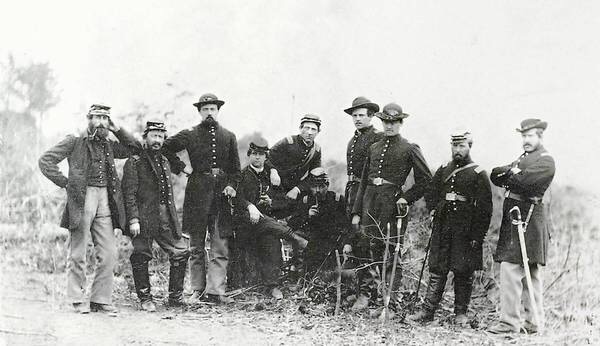
officers of the 153 Pennsylvania Volunteers
30th of June, 1863:
I never heard of any man, woman, or child being insulted … .we travelled through a very fine section of country this day and about six o’clock p. M. Arrived at Emmitsburg, all tired ….the sun came out, and we had a nice day …
Emmitsburg 1873
During the day, we moved to the north of the town, where our artillery had taken up position, and had some works. For a man of 21, I feel 61 years old, my knees being stiff, it is with difficulty that I can walk.
the 2nd Artillery battery
A thunderstorm came up in the afternoon, and consequently, Chunky and David had to put up their tent in pouring down rain. They made camp the best they could while talking about something they remember seeing a ways back down the road. While the troops were marching through town, both men had noticed a nice bed of onions in a garden. Just about dusk, they returned to town and borrowed a few onions out of that garden.
The next morning the Company left for Gettysburg before the pickets came in. Consequently, the two boyhood friends got into that first day’s fight. The pickets did not get there in time to get into it, but they got a good dose in the skirmish line on the 2d day. They were all wounded, but one or two before the battle was over. Later the men could only account for one man by the name of Rube, who did not get hurt.
No date:
. . .As near as I could judge the time, without a watch, it must have been after nine o’clock before we left camp. We went very slow starting out. At the state line we were informed that we were crossing into Pennsylvania, our caps went up in the air and gave three cheers for our native
State. The wagon train of the first corps had blocked the road, and we were delayed for some time on account of it. Then we started across the fields to the right, went through corn and wheat fields, till we got to another road, we had just gotten into this road when we saw a horseman coming at a fearful gallop. 1 thought he was riding a white horse, but when we got to the head of the column, I saw it was a gray and the lather on him must have been an inch thick. 1 also noticed that we began to step out faster, and it was not long till we saw another messenger with more orders from the front. I heard the boys say ‘there is another long envelope coming,’
As the bugle called general orders. We met five or six of these before we reached Gettysburg. After we had received the second one we got down nearly to a dog trot, and kept that gait until we got to Gettysburg
Gettysburg
When the Pennsylvania line was reached, and crossed, what glad shouts went up from the Keystone boys, of “home again.” Some of the men bent over and kissed the ground. While still marching, David wrote a single line in his diary.
No date:
Alas, how many never left it, but lie now mouldering in that silent city of her beloved dead!
Next: The battle of Gettysburg
>>>Click here <<<
